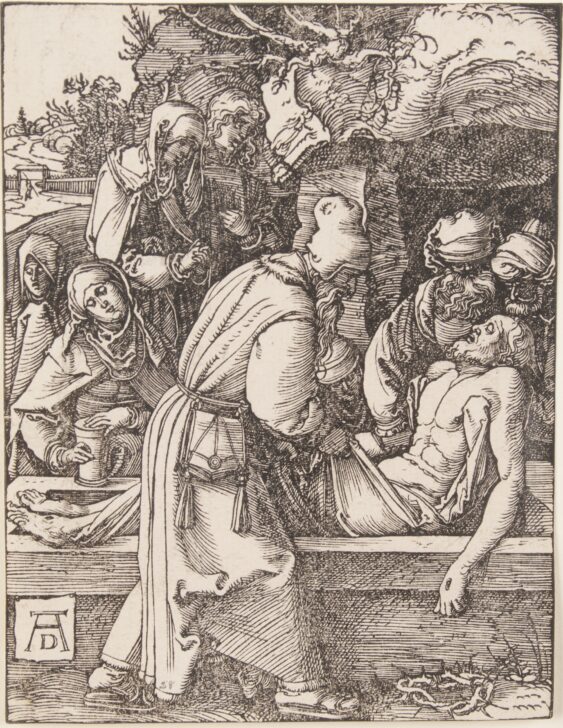The Entombment from “The Small Woodcut Passion”
Albrecht Dürer

Description
Albrecht Dürer
Germany, 1471–1528
Entombment, from the Small Woodcut Passion
1509–11
Woodcut
Gift of Professor Eugene and
Mrs. Marie Glysson, 2011/2.57
These three prints come from Durer’s Small Woodcut Passion, comprised of thirty-six images comprehensively illustrating the history of Christian salvation beginning with the Expulsion of Adam and Eve from the Garden of Eden and ending with the
Last Judgment. Their modest size suggests that they were intended to be used as devotional images, which were common in the late middle ages as aids to the vivid imagining of Christ’s life. Dürer’s compositions position the viewer as an intimate witness to emotionally powerful scenes, encouraging, for example, empathy with the suffering of Christ standing bound before Caiaphas, the column in the background a reminder of his subsequent flagellation (left), or sorrow when his dead body is lowered into tomb, the crown of thorns and his hand wound prominently displayed (right), or perhaps consolation at seeing the souls of the righteous who lived before Christ (such as Adam and Eve) brought forth from the mouth of hell (center).
The Small Woodcut Passion, first published in 1511, was so popular that it was reprinted many times. Woodcut is a relief technique in which wood is carved away to leave raised lines that will be coated with ink and then pressed onto paper to make a print, creating images of graphic clarity and vivid details. Cheaper to produce than engravings (examples of which are on other side of this case), woodcuts were the first mass-produced images and historically were used for devotional purposes.
(Gallery Rotations Fall 2012)
Subject Matter:
This print features the entombment of Christ after his Crucifixion. Set in a rugged landscape, followers, including Joseph of Arimathea, lower the body of Christ into a stone tomb in the foreground. The evidence of the Passion can be seen in the wounds on Christ's hands and feets, and is further symbolized in the crown of thorns at the foot of the tomb. The Virgin and Saint John the Evangelist stand watching in quiet contemplation, while other mourners sit at the far left. Mary Magdalene kneels at the feet of Christ with a jar of ointment.
Physical Description:
A group of four men gently lower a figure into a tomb that is placed parallel to the viewer. To the left is a group of mourners with hands clasped. One female figure kneels at the ledge of the tomb and holds a covered jar. Behind the figures is a rocky landscape with a fence and guard at the gate in the distance at the left. An entrance to a cave is indicated on the right, directly behind the tomb, with the use of dense, dark hatching. At the lower right corner is a circlet of thorny branches.
Usage Rights:
If you are interested in using an image for a publication, please visit https://umma.umich.edu/request-image/ for more information and to fill out the online Image Rights and Reproductions Request Form.